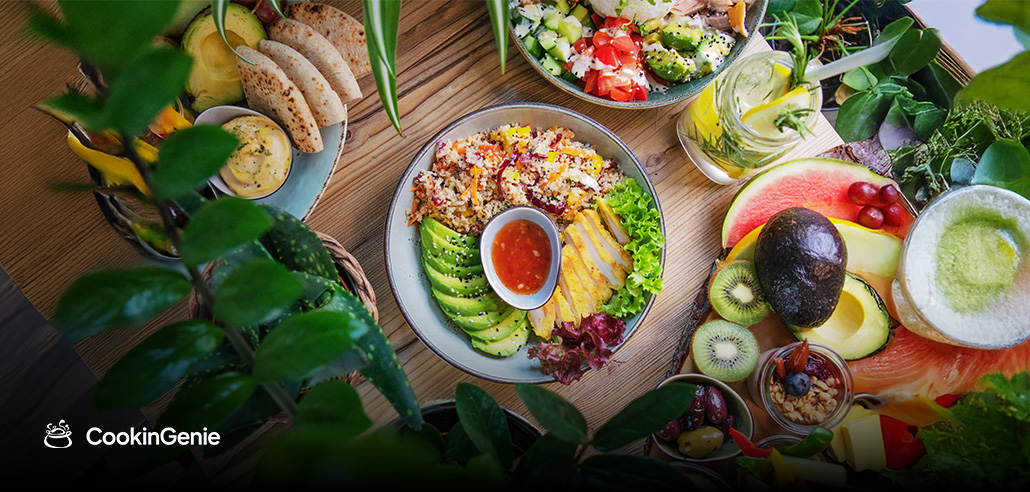Tips for Sustainable Cooking- Techniques and Benefits
Are you tired of cooking the same old meals every day and looking for ways to make your cooking more sustainable? Look no further. Sustainable cooking is a cooking approach that prioritizes the use of ingredients, techniques, and practices that minimize environmental impact, reduce waste, and support local communities. By adopting sustainable cooking practices, you can reduce your carbon footprint, conserve natural resources, support local farmers and producers, and promote healthy eating habits. Not only that, but sustainable cooking can also help you explore new ingredients and techniques that can add flavor and excitement to your meals. So, if you’re ready to take your cooking to the next level, join us as we explore some tips for sustainable cooking.
Benefits of Sustainable Cooking
Adopting sustainable cooking practices can not only help to reduce our carbon footprint but also provide numerous benefits for our health, environment, and local communities. By prioritizing ingredients, techniques, and practices that minimize environmental impact, reduce waste, and support local farmers, we can enjoy delicious, healthy meals while also making a positive impact on the world. Here are just a few of the many benefits that come with sustainable cooking.
- Lower Carbon Footprint: By choosing sustainably-sourced ingredients and reducing food waste, you can significantly lower your carbon footprint. This means you can help mitigate the impact of climate change while still enjoying delicious and nutritious meals.
- Conserves Natural Resources: Sustainable cooking practices promote the conservation of natural resources, such as water, soil, and energy. By making more conscious choices about what we eat, we can help protect our planet’s resources for future generations.
- Supports Local Communities: By buying local and seasonal produce, we can support our local farmers and food producers. This, in turn, helps to strengthen our local economy and create more sustainable food systems.
- Promotes Healthy Eating Habits: Sustainable cooking encourages the use of fresh, whole, and nutrient-dense ingredients. By prioritizing these foods, we can improve our overall health and wellbeing while reducing our impact on the environment.
- Reduces Food Waste: Sustainable cooking practices, such as meal planning and proper food storage, can help reduce food waste. This not only saves money but also helps to reduce greenhouse gas emissions and conserve natural resources.
Sustainable Cooking Techniques
Sustainable cooking is not only about choosing the right ingredients and shopping mindfully but also about adopting cooking techniques that can help reduce the environmental impact of our meals. By using sustainable cooking techniques, we can save energy, reduce water usage, and conserve natural resources. Here are some techniques that you can easily adopt in your kitchen to make a positive impact:
- Efficient use of energy: Making efficient use of energy while cooking can reduce energy consumption and save money. For instance, using the right size burner and lids when cooking can help retain heat, cook food faster, and reduce energy consumption.
- Using eco-friendly cooking equipment: Eco-friendly cooking equipment can significantly reduce energy consumption. Induction cooktops, for instance, use less energy and heat up faster than conventional cooktops. Energy-efficient ovens can also help reduce energy consumption.
- Reducing water usage: Conserving water resources is a crucial part of sustainable cooking. You can reduce water usage by using efficient dishwashers, composting toilets, and water-saving techniques when cooking. For instance, using a vegetable steamer instead of boiling vegetables in a pot can help conserve water.
- Reducing meat consumption: Reducing meat consumption, especially beef and lamb, can significantly reduce greenhouse gas emissions and conserve natural resources. Livestock production is one of the major sources of greenhouse gas emissions and requires a significant amount of land, water, and feed.
- Eating plant-based meals: Eating more plant-based meals can reduce the environmental impact of our food choices and improve our health. Plant-based meals are not only healthier but also require fewer resources to produce than animal-based meals. Incorporating plant-based meals into your diet can be as simple as swapping meat for plant-based protein sources like legumes, tofu, and tempeh.
By adopting these sustainable cooking techniques, we can make a positive impact on the environment while also enjoying delicious and nutritious meals.
Conscious Kitchen Practices
Conscious Kitchen Practices can have a significant impact on our environment, and this section of the blog post will highlight sustainable practices that can be adopted in the kitchen to reduce waste and conserve natural resources. By adopting these conscious kitchen practices, we can take a step towards a more sustainable lifestyle. Here are some key practices that will be covered in this section:
- Composting food scraps: Composting food scraps is a simple way to reduce the amount of organic waste sent to landfills, which in turn reduces methane emissions and produces nutrient-rich soil. Composting is an easy and inexpensive way to create your own fertilizer and reduce your environmental impact.
- Recycling properly: Proper recycling can reduce the waste sent to landfills and conserve natural resources. By learning how to recycle properly and what can and cannot be recycled, we can make a significant impact on the environment.
- Avoiding single-use plastic: Avoiding single-use plastic, such as plastic bags and straws, can reduce plastic pollution and conserve natural resources. We can adopt simple habits such as bringing reusable bags and water bottles, and avoiding disposable utensils and containers to reduce our plastic waste.
- Cleaning with eco-friendly products: Cleaning with eco-friendly products, such as vinegar and baking soda, can reduce the use of harmful chemicals that harm the environment. These natural products are just as effective as chemical cleaners and can be used for a variety of cleaning tasks.
- Reducing paper waste: Reducing paper waste by using digital receipts and reusable towels can reduce the environmental impact of our kitchen practices. By choosing to go paperless or using reusable towels, we can reduce our carbon footprint and conserve natural resources.
Sustainable Eating Habits
Eating is an essential part of our daily lives, and the food choices we make can have a significant impact on the environment. Sustainable eating habits can not only reduce our carbon footprint but also promote healthier lifestyles. Here are some key pointers to help you adopt sustainable eating habits:
- Eating whole foods: Eating whole foods, such as fruits, vegetables, whole grains, and nuts, provides essential nutrients and can reduce the environmental impact of our food choices. Whole foods are often less processed and come with less packaging waste compared to processed foods.
- Minimizing processed foods: Minimizing processed foods can reduce the use of harmful additives and packaging materials. Processed foods often come with excess packaging waste and have higher levels of preservatives, artificial flavors, and colors.
- Eating more plant-based meals: Eating more plant-based meals can reduce the environmental impact of our food choices and improve our health. Plant-based diets are associated with lower carbon emissions and better health outcomes.
- Reducing food waste: Reducing food waste by eating leftovers, freezing food, and composting can reduce the environmental impact of our food choices. Food waste is a significant contributor to greenhouse gas emissions and puts pressure on landfills.
- Avoiding overconsumption: Avoiding overconsumption of food can reduce waste and promote healthy eating habits. Eating smaller portion sizes and avoiding unnecessary snacking can help reduce food waste and improve overall health.
By adopting sustainable eating habits, we can make a positive impact on the environment while also promoting healthier lifestyles.
Conclusion
In conclusion, sustainable cooking practices not only benefit the environment but also contribute to healthier eating habits for ourselves and our communities. By incorporating the tips and techniques discussed in this post, we can all make a positive impact on the environment and conserve natural resources for future generations.
But our efforts don’t have to stop there. Hiring a private chef who specializes in sustainable cooking can take your efforts to the next level. A private chef can introduce locally sourced and organic ingredients, reduce food waste, and select eco-friendly cooking equipment that aligns with your sustainability goals. They can help you make conscious choices in your daily meals, while still enjoying delicious and nutritious food.



 Settings
Settings
 Gift Card
Gift Card Blog
Blog Locate Us
Locate Us










 Home
Home
 Chefs
Chefs
 Chats
Chats
 My Order
My Order



